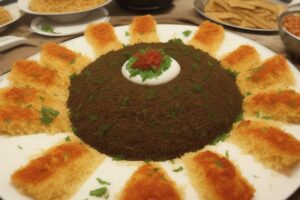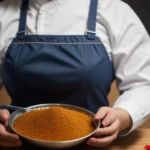
Arab cuisine finds its origins in the ancient civilizations of the Middle East, deeply influenced by the culinary traditions of Mesopotamian, Egyptian, and Persian cultures. Over centuries, it has evolved through interactions with diverse invaders and traders, resulting in a dynamic and diverse culinary heritage.
Exploring the Essence: Essential Ingredients of Arab Cuisine
At the heart of Arab cuisine lie fresh and wholesome ingredients, including lamb, chicken, rice, wheat, chickpeas, eggplant, tomatoes, onions, garlic, and a myriad of herbs and spices. These ingredients form the foundation of a multitude of dishes, ranging from hearty stews to fragrant rice pilafs.
Spice Infusion: A Distinctive Flavor Profile
Spices play a pivotal role in Arab cuisine, imbuing dishes with depth and complexity. Cinnamon, cumin, coriander, turmeric, paprika, and sumac are among the key spices used, enhancing the flavor profile of a diverse range of culinary creations.
Influential Intersections: Mediterranean Influence on Arab Cooking
The Mediterranean region has significantly influenced Arab cuisine, particularly in nations like Lebanon, Syria, and Palestine. Ingredients such as olive oil, lemons, olives, and parsley, alongside cooking techniques like grilling and roasting, contribute to the vibrant flavors of Arab dishes.
Communal Dining: Embracing Mezze
Mezze, a selection of small dishes served as appetizers, embodies the communal spirit of Arab cuisine. Popular mezze dishes like hummus, baba ghanoush, tabbouleh, falafel, and stuffed grape leaves foster sharing and conviviality around the dining table.
Mastering the Grill: A Tradition of Flavorful Grilling
Grilling holds a cherished place in Arab cuisine, with meats such as lamb, chicken, and beef often cooked over open flames. Seasoned with a blend of spices and herbs, grilled meats offer a smoky and savory flavor that is quintessentially Arab.
Versatile Staples: Exploring Flatbreads in Arab Cuisine
Flatbreads, including pita, lavash, and mana’eesh, serve as versatile accompaniments to various dishes in Arab cuisine. Whether used for dipping, wrapping, or as a side, flatbreads add texture and flavor to every meal.
Indulging the Sweet Tooth: Decadent Finale with Arab Sweets
Arab cuisine is renowned for its delectable sweets and desserts, often sweetened with honey, sugar, or rose water. Treats like baklava, knafeh, ma’amoul, and halva provide a delightful conclusion to any Arab meal.
Cultural Ritual: The Art of Brewing Arabic Coffee
Arabic coffee, brewed from lightly roasted coffee beans and flavored with cardamom, saffron, or rose water, symbolizes hospitality and tradition in Arab culture. Served alongside dates or sweets, Arabic coffee fosters connections and camaraderie.
Preserving Tradition: Bedouin Heritage in Arab Cuisine
Bedouin cuisine, practiced by the nomadic tribes of the Arabian desert, emphasizes simplicity and authenticity. Featuring ingredients like lamb, goat, wheat, and dates, Bedouin dishes cooked over open fires or in underground ovens offer a taste of tradition.
Hospitality Personified: Shared Meals, Lasting Memories
Arab cuisine is synonymous with hospitality, as meals are shared in a communal setting with loved ones. Generous portions, diverse flavors, and a warm atmosphere characterize the dining experience, fostering connections and cherished memories.
Healthful Choices: Embracing the Nutritional Benefits
With a focus on fresh and natural ingredients, Arab cuisine offers a nutritious and wholesome dining option. Low in saturated fats and high in fiber, vitamins, and minerals, Arab dishes contribute to overall health and well-being.
Authentic Delights: Reveling in Arab Street Food
Arab street food, including falafel, shawarma, and kebabs, delights locals and tourists alike with its vibrant flavors and convenience. These popular dishes provide a delicious glimpse into Arab culinary tradition.
Innovation in Tradition: The Evolution of Arab Cuisine
As Arab cuisine gains global recognition, chefs are innovating traditional recipes with modern twists and global ingredients. From creative cooking techniques to fusion cuisine, Arab gastronomy continues to captivate and inspire culinary enthusiasts.
Bringing Arab Cuisine Home: A Culinary Adventure
Explore the flavors of Arab cuisine in your own kitchen by experimenting with traditional recipes and ingredients. With resources readily available, cooking Arab dishes offers an opportunity to discover new flavors, learn culinary techniques, and create memorable meals to share with loved
















